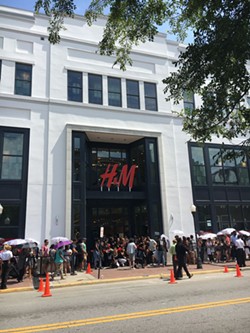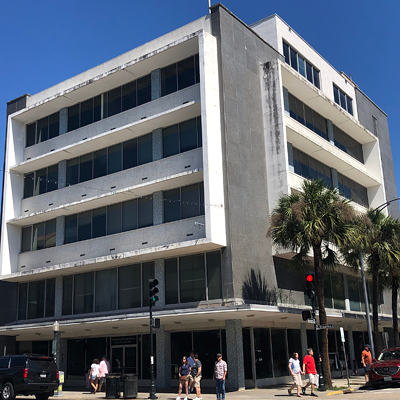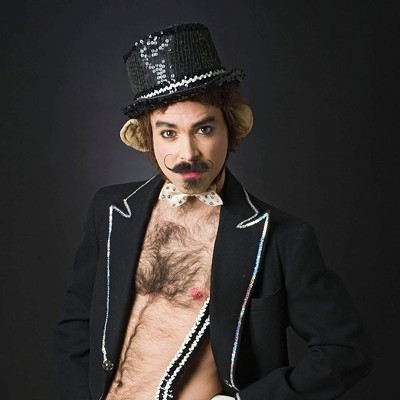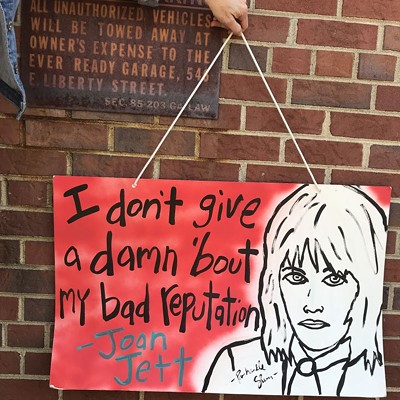WHEN THE cops are called about noise on Broughton Street, it’s usually because some bachelorette party from Vidalia is screeching Rihanna karaoke under the streetlamps after last call.
But it was barely 11 a.m. when SCMPD responded to a complaint about the Justin Timberlake tunes blaring out the of the new H&M building last Thursday.
It seems at least one person was outraged about the grand opening of the fast fashion chain, lobbing a tiny pebble of discontent against the Swedish retail Goliath, known for its hot looks at cheap prices.
The 300 or so others waiting outside for the doors to open felt exactly the opposite. Some style diehards had showed up at 8:30am to be the first to get their shopping on, and turning the DJ down a decibel couldn’t dampen their enthusiasm. The cops bowed out quickly, and the festive mood was stoked by more fabulous fanfare and friendly employees handing out free swag. You’d have thought David Beckham himself was modeling his H&M underwear line from the swoons and cheers in the last seconds before the double doors parted (accompanied by the power chords of Europe’s “The Final Countdown,” natch.)
As I watched the crowd pour in from across the street, a light cotton scarf of ambivalence settled on my shoulders. One foot wanted to skip on in and see what was on sale, the other stood firmly planted in resistance.
At 32,000 square feet divided into four floors of affordably-priced overalls, crop tops and “meggings” (men + jeggings; I know, I’m scared, too,) the massive ivory tower is the largest and splashiest manifestation of Ben Carter’s real estate takeover of Savannah’s main street yet.
It’s been surreal to watch mall staples like Victoria’s Secret, M.A.C. and Clockwork inhabit former mom-and-pop spots in some kind of Invasion of the Commerce Snatchers, the neon signs overshadowing whatever was left of our small-town singularity.
Yet who can deny that brightly-lit stores full of pretty things are better for the city than shuttered storefronts? Anyone who remembers Broughton in the ‘80s knows decrepitude doesn’t sell. Corporations are more likely to provide healthcare and competitive wages, and the new H&M just added 30 jobs.
And let’s remember forty percent of the billions of SPLOST dollars raised for drainage projects and schools comes from out of town visitors, some of whom feel that shopping at J. Crew in Savannah is different than at home. At least while they browse Broughton they have a chance of discovering our local couture businesses still standing like J. Parker, Civvies, Zia and Midge, a recent west end addition that sells only frocks, denim and accessories manufactured in the U.S.A. (BTW, have you gotten your free #LocalLove pin yet?)
It’s not only tourists who are spending their cash at the corporate conglomerates. L’Occitane manager Shena Verrett reports that the Savannah outpost of the the France-based skincare line is a top performer in the region supported by a loyal local base, and I’ve witnessed an uptick in Kate Spade bags amongst my lady friends.
So while some of us are enjoying the increased variety and surging economy that big business brings, the rest of us continue to lament the Carterization of Broughton. But the reality is that it was sold out long before McDonald’s built a walk-up window on the corner of Jefferson.
I am no loyalist to any corporate brand on principle, but I must admit to not completely hating H&M. I still wear a linen skirt I bought in San Francisco 15 years ago, and I like that my plus-sized sisters have the same style options as the ones who wear a size 4. And it’s nice to see children dressed in something other than Garanimals and smocking.
Still, staring at what was once a law office and a vacant lot, I couldn’t help but blanch at this hulking monument to fast fashion—an industry predicated on the unsustainable notion of manufacturing clothing as cheaply as possible so that it will fall apart or go out of style faster than milk expires. The multi-billion dollar business model depends on consumers’ insatiable hunger for the freshest styles—and our willingness to ignore the ecological and ethical abuses that make it possible. (It took 700 gallons of water to make that butter soft baby T, no joke.)
As far as corporate chains go, H&M at least acknowledges some of its negative impact. It’s implemented a sustainability department that tracks its use of organic cotton and other renewable resources, and the company recycles a small percentage of textiles to offset the 10 billion pounds of discarded clothing a year that ends up in the world’s already overflowing landfills.
But slow fashion advocates like Erica Jarman calls those efforts “classic greenwashing.”
“It’s all smoke and mirrors,” says the proprietor of the vintage wonderland House of Strut.
“It’s basically symbolic. They’re still manufacturing 600 million items a year, and there is no way to reduce the environmental impact other than to produce less.”
We also know that those $7 T-shirts have a far more disturbing human price tag. The 2015 documentary The True Cost reveals the exploitation and horrendous working conditions of garment factory workers in India and other faraway lands, and most H&M-sourced facilities still don’t have working fire exits even after the 2012 tragedy that killed hundreds in Bangladesh.
“There are 70 million garment workers in the world and 80 percent are women,” reminds Erica. What we wear matters.”
It’s not just the third world that’s suffering from our addiction to cheap duds. Containers full of rompers and manpris arrive daily at our ports, and those who disperse it to all those outlets, malls and made-over main streets continue to endure unfair treatment.
Deregulation of the trucking industry in the ‘80s means drivers are subject to unforeseen expenses, long hours without compensation and predatory lease agreements for their rigs, adding another layer of unseen labor to those artfully-distressed jeans.
In June, truck drivers trying to form a union in Port Wentworth had a setback when organizers were intimidated by local police and cited for impeding traffic on a dead end street in an incident captured on one of the officer’s bodycam.
Though Port Wentworth’s city attorney advised that the charges be dropped, the chief of police insisted they stand, instead offering a plea deal that came with the stipulation that the organizers not set foot in the town again. That deal was roundly rejected, and the case will head to State Court in Savannah sometime in December.
The Teamsters also plan to pursue a separate lawsuit based on the violation of their First Amendment Rights and have no intention of agreeing to the chief’s admonitions.
“We will be back in Port Wentworth,” vows union leader Ben Speight. “We have the right to organize, and these truckers have the right to a seat at the table.”
After seeing the shadows cast by those peek-a-boo halter tops, many frugal fashionistas are waking up to the far more humane and sane practices of thrifting, swapping, buying better quality and just buying less. My own buying habits have leaned that direction for decades, but they certainly aren’t beyond reproach.
After milling around outside for a while, I finally joined the throngs to see just what H&M sells these days. (Fun fact: Mustard is the apparently new couleur de la saison.)
As I perused the racks with many folks genuinely excited about floral prints and polyester blends, I kept thinking about how much we invest—financially and otherwise—in what we wear and where we buy it.
The opening of a new place to shop has become a bonafide form of entertainment and personal action, and I couldn’t help but wish we got as excited about social justice and fair labor practices.
Maybe we will someday, when and if, to paraphrase cultural sage Toni Morrison, we can reclaim our identities as citizens instead of consumers.
Until then, sometimes a girl can’t resist a new Joan Jett tank top.






























